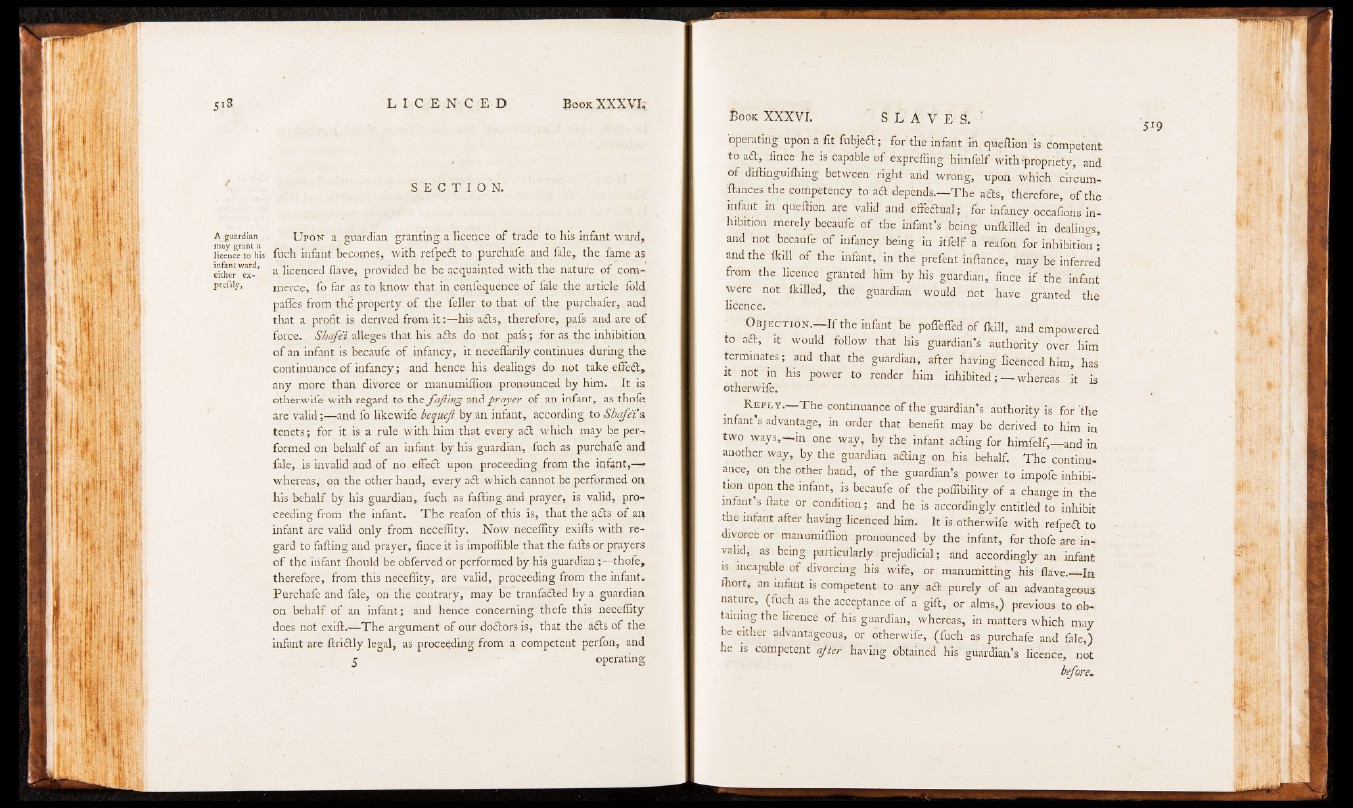
S E C T I O N .
A guardian U pon a guardian granting a licence o f trade to his infant ward,
licence m his fuch infant becomes, with refpedt to purchafe and fale, the fame as
èïtfS rWex-’ a licenced flave, provided he be acquainted with the nature o f com-
Pr?%> rnerce, fo far,as to know that in confequence o f fale the.article fold.
paffes from thé property of the feller to that of the purchafer, and
that a profit is derived from it :—his aQ:s,, therefore, pafs and are of
force. Shaféi alleges that his a£ts do not pafs; for as the inhibition
o f an infant is. becaufe. of infancy, it neceffarily continues during the
continuance of infancy; and hence his dealings do not take effect,
any more than divorce or manumiffion pronounced by him. It is
otherwife with regard to the fajiing and prayer of an infant, as thole
are valid;— and fo likewife bequeji by an infant, according to Shqfets.
tenets; for it is a rule with him that every aft which may be performed
on behalf o f an infant by his guardian, fuch as purchafe and
fale, is invalid and of no effedt upon proceeding from the infant,— ■
whereas, on the other hand, every a£t which cannot be performed on
his behalf by his guardian, fuch as faffing and prayer, is valid, proceeding
from the infant. T h e reafon of this is, that the acts of an
infant are valid only from neceffity. Now neceffity exifts with regard
to faffing and prayer, fince it is impoffible that the faffs or prayers
o f the infant Ihould be obferved or performed by his guardian;—thofe,
therefore, from this neceffity, are valid, proceeding from the infant.
Purchafe and fale, on the contrary, may be tranfadled by a guardian
on behalf of an infant; and hence concerning thefe this neceffity
does not exift.— The argument of our doctors is, that the acts of the
infant are ftricily legal, as proceeding from a competent perfon, and
5 operating
B ook X X X V L S L A V E S .
operating upon a fit fu bje ff; for the infant in queftion is competent
to a£t, .fince he is Capable o f expreffing h imle lf with propriety, and
o f diftinguilhing between right arid wrong, upon which circurn-
ffancës the competency to a ft depends.— 'The a è s , therefore, o f the
infant in queftion are valid and effedlual; for infancy occafions inhibition
merely becaufe o f the infant’k being unlkilled in dealings,
and not becaufe o f infancy being in itfe lf a reafon for inhibition;
and the Ikill o f the infant, in the pre'fent inftance, may be inferred
from the licence granted him by his guardian,1 finBe i f the infant
were not lkilled, the guardian would not have granted the
licence. :
O b je c t io n .— If the infant be poffeffed o f Ikill, and empowered
to aét, it would follow that his guardian’s authority over him
terminates; and -that the guardian, after having licenced him, has
it not in his power to render him inhibited; — whereas it is
otherwife.
R e p l y .— The continuance o f the guardian’s authority is for 'the
infant s advantage,- in order that benefit may be derived to him in
two ways,— in one way, by the infant affing for himfelf,— and in
another way, by the guardian aöing on his behalf. The continuance,
on the other hand, of the guardian’s power to impofe inhibition
upon the infant, is becaufe of the poffibility of a change in the
infant s ftate or condition; and he is accordingly entitled to inhibit
the infant after having licenced him. It is otherwife with refpedt to
divorce or manumiffion pronounced by the infant, for thofe are invalid,
as being particularly prejudicial; and accordingly an infant
is incapable of divorcing his wife, or manumitting his Have.— In
fhoit, an infant is competent to any adt purely of an advantageous
nature, (fuch as the acceptance of a gift, or alms,) previous to obtaining
the licence o f his guardian, whereas, in matters which may
be either advantageous, or otherwife, (fuch as purchafe and fale,)
he is competent after having obtained his' guardian’s licence, not
before.